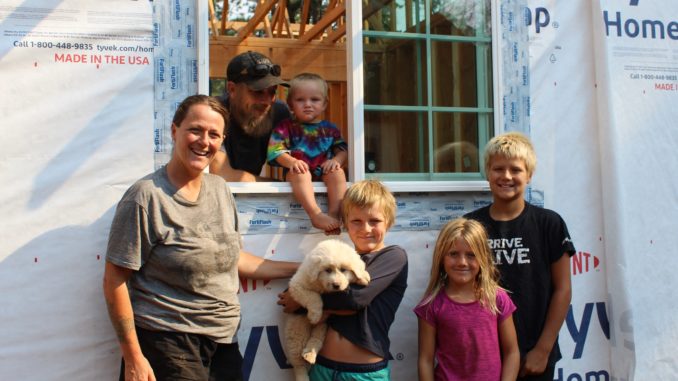
It’s been almost two years since the Camp Fire destroyed Concow, and Inez Salinas is bathing her 4-year-old daughter in a plastic bin.
River enjoys bath time with Mom, Salinas said, and couldn’t care less where she’s at. However, for Mom, life at their rural home is a daily struggle. Salinas has no well or septic on the property, and her tiny house, which she received this past winter, runs off a generator. She gets her water from a friend (many delivery companies won’t make the trek to Concow, she said) and has limited storage capacity in the tank she received as a donation.
To make matters worse, unless a Butte County disaster recovery ordinance—which allows residents to live in temporary housing units (such as trailers and tiny homes) without water, wastewater and electricity—is extended beyond this year, her tiny home will become illegal to inhabit on her property.
All the money she received after the disaster—a combination of the good will of strangers and friends, aid from the American Red Cross and her payout from the Federal Emergency Management Agency—went to purchasing her land. It was all she could afford. She can’t finance building a bigger home; the thousands she’d have to shell out in permitting costs alone is prohibitive.
“I live from penny to penny,” Salinas said. “A lot of us [in Concow] didn’t have insurance or don’t make enough to rebuild.”
While some areas decimated during the Camp Fire are slowly coming back to life—especially in Paradise, where newly built homes are for sale and apartment buildings are being erected—thousands of people are still struggling nearly two years after the blaze ignited on Nov. 8, 2018. For smaller rural areas such as Concow, where approximately 500 homes (nearly 70 percent of the community) were destroyed, recovery has been much slower. Many people are living in RVs, tents, cars and sheds, and access to water, power and septic is a luxury.
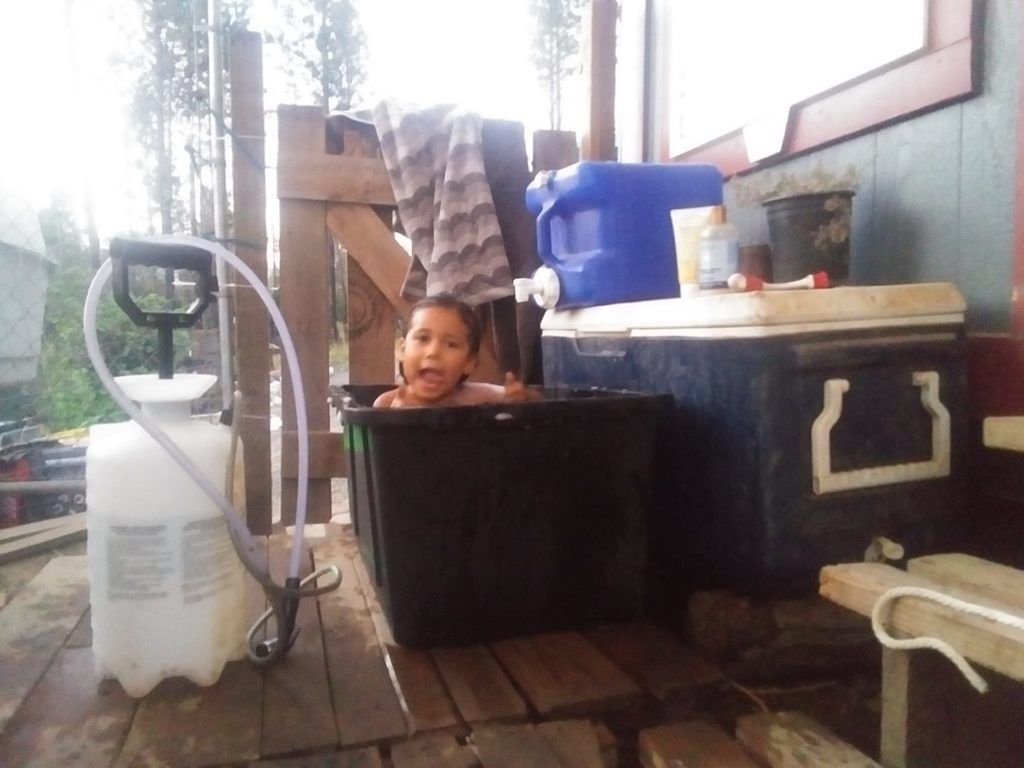
One critical barrier to recovery has been a lack of post-fire administration to address the overwhelming need. Thousands of struggling survivors have been waiting in a community queue to receive a disaster case manager from one of the many organizations working with the Camp Fire Collaborative (formerly the Camp Fire Long Term Recovery Group).
Plus, the COVID-19 pandemic has delivered another big setback to efforts to rebuild, regain employment and reestablish community.
Salinas was homeless before she moved to Concow four years ago. She was living in an RV on rental property she intended to purchase before the fire destroyed everything she owned and rendered her homeless yet again. It was extremely hard to secure the raw land she found, she told the CN&R, but she knew she needed to act fast and thought, At least we’ll have a place.
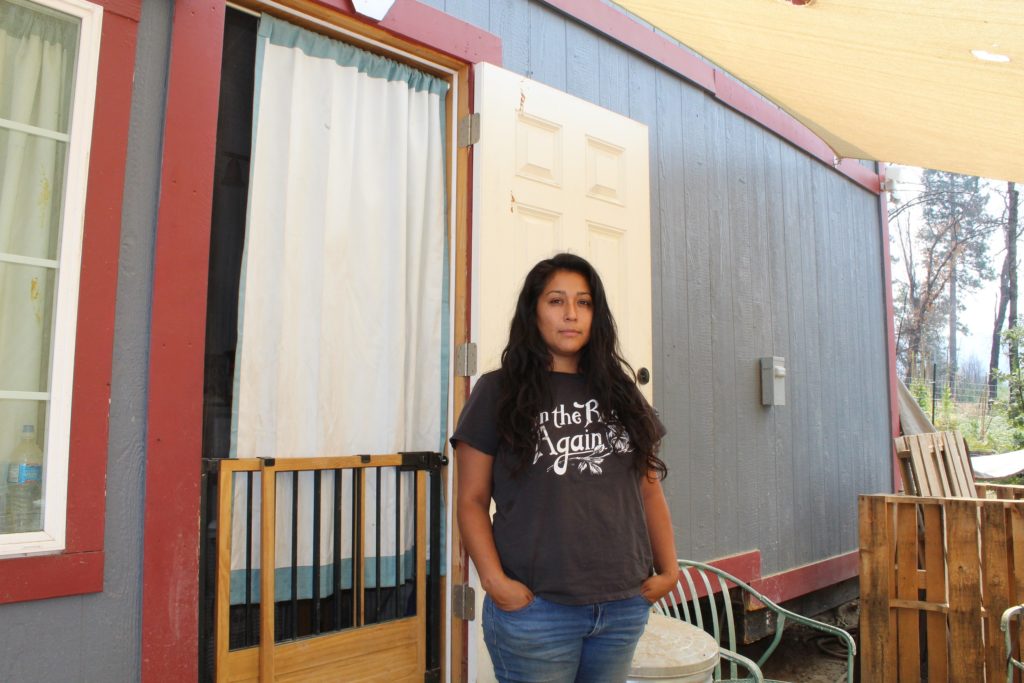
Moving forward with infrastructure for her property has been challenging, however, and Salinas fears for River and her future.
“[These barriers are] totally halting recovery,” Salinas said. “If I dwell on it too much—my mental health—I can’t do it.”
They need more time
In Concow, folks live a slower-paced, rural lifestyle. Many turned to the area for its lush forested hills and its remoteness. It’s an affordable, peaceful place for those wanting to escape the noise of city life or settle down and raise a family.
But the conditions post-Camp Fire are not what they once were, even in this region that is accustomed to wildfires. Previously, the most devastating disaster was the 2008 Butte Lightning Complex Fires. In fact, there still are downed trees yet to be removed from the that fire, which destroyed 202 homes.
Most residents in the region were under- or uninsured when the Camp Fire hit. The lack of financial help—added to the fact that Concow, like the rest of Butte County, already experiences a poverty rate that’s higher than the state average—has made life in the woods post-Camp Fire very difficult for many. It’s not uncommon for families to be forced to choose between necessities: propane or groceries.
In addition, the county’s Camp Fire Disaster Recovery ordinance is set to expire Dec. 31—rendering temporary housing illegal and giving code enforcement the ability to deem such properties as uninhabitable. However, Butte County Deputy Administrative Officer Casey Hatcher said the county recognizes that many residents still are struggling to attain stable housing in the aftermath of the fire. Staff will bring the ordinance before the Board of Supervisors in the coming months, recommending an extension.
Hatcher noted that the county has to balance the need to have people in safe, standard housing with the reality that many cannot afford to relocate or rebuild right now. Federal Community Development Block Grant Disaster Recovery funds for California communities devastated by the 2018 wildfires—geared toward addressing unmet housing, infrastructure and economic needs—have yet to be disbursed, and neither have PG&E settlement dollars.
Infrastructure is another issue. Other parts of the county, such as Paradise and Magalia, have mostly public roads, plus water systems and planning areas with subdivision maps. Concow has mostly private roads—many unpaved and with access, safety and costly repair issues—and properties that rely on well systems and septic that are in need of repair. These additional costs associated with rebuilding pose more challenges to recovery.
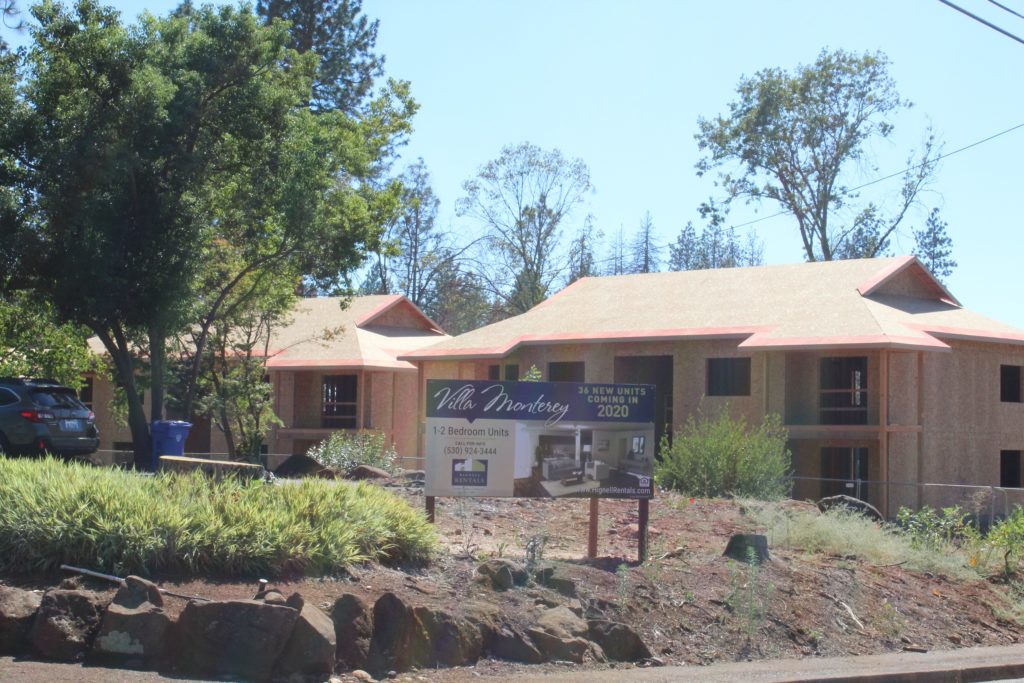
“It’s really a big picture that has to be taken into consideration,” Hatcher said. “The timeline of two years, it feels like the blink of an eye, and so many people are not in a place to be ready to and able to move out of those [temporary] units in a sustainable way.”
A slow rebuild
Even for families who have been able to move forward with rebuilding in Concow, the process has been slow going.
Take Emilia and Chad Erickson. They have the framework of a home erected on their property. But the process has been far from easy—Emilia, a mother of four, said she’s had to fight to get little things accomplished. Her husband is building their home for about $90,000 and is progressing thanks in part to allowances under the county’s Title 25 ordinance, aka the “owner builder code,” which waives some costly requirements, such as an indoor sprinkler system, for homes under 1,200 square feet.
Since moving back to their property in April 2019, they’ve lived in a tent and then in a trailer.
Emilia has been a community leader in recovery as the Camp Fire zone captain for Concow, part of The Camp Fire Zone Project, a group of volunteers dedicated to helping their neighbors rebuild. She said her family has doggedly pursued their recovery, yet still faced hurdle after hurdle when it came to expenses and acquiring assistance. Even with Title 25 provisions, their permitting fees alone cost between $5,000 and $6,000.
“I jumped through 25 million hoops on fire to try to get this house built. And meanwhile, there’s people who still have piles of debris on their property and they haven’t even had their cleanup happen yet,” she said. “People just need help in every way shape and form and the biggest help is money. It is so expensive to do things legal.”
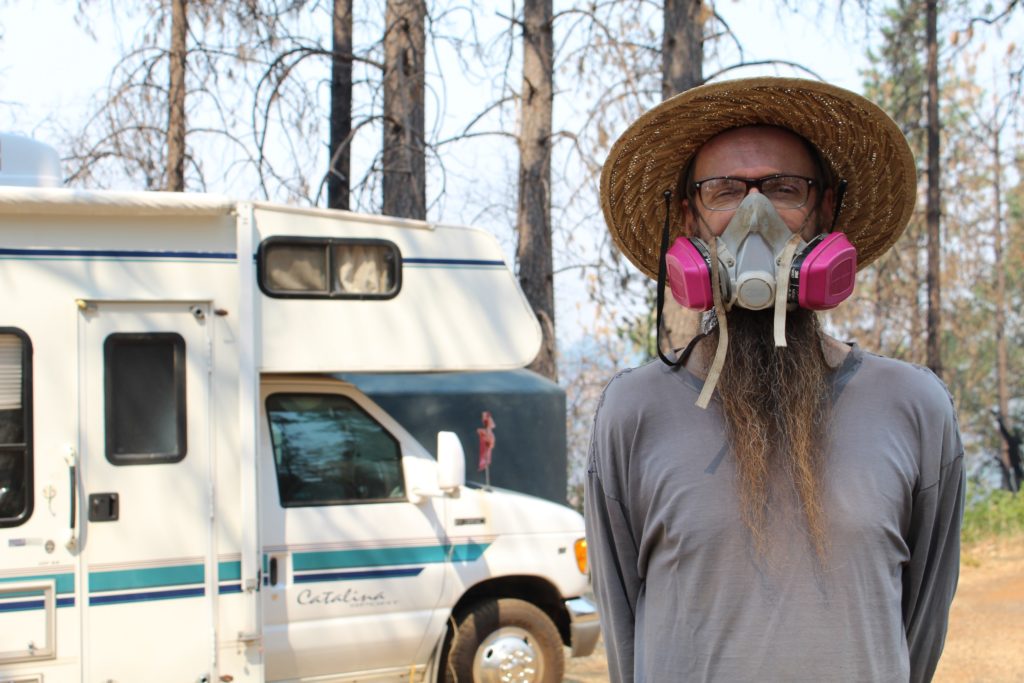
Hap Hathaway, a fixture in the local music community who has lived in Concow for about 20 years, also is rebuilding—slowly. He and his wife and son are still living in an RV. They were able to get financial assistance through their disaster case manager to install and fix their well and pumping system. However, they’ve experienced delays in their progress due to disaster case manager turnover. It’s a big task trying to navigate the rebuilding process with the county on top of working, raising their kid and trying to take care of their mental health, Hathaway said. It’s a financial hardship to pay permit fees, even with both of them working full-time
Hathaway remembers how hard it was to get resources in Concow even before the fire. He and his wife tried for years to secure home insurance after the 2008 Butte Lightning Complex Fires. They hit dead ends continually while pestering adjusters and insurers. Then they lost everything to the Camp Fire.
“Everybody needs food, clothing, shelter, medicine and energy … and [that’s] all lacking up here,” he said. “Everybody’s still struggling to get basic water and power. … They can barely afford to keep gas in the generator and food in the cupboard.”
It’s not as simple as packing up and finding another place to live.
“With what resources?” he said. “There’s still people out here falling through fissures. It’s not cracks out here, we’ve got canyons.”
Hathaway added: “People’s sense of home is something they don’t want to lose. … No one should have to leave that because of a fire.”
Coronavirus has further impeded the progress of community leaders when it comes to rebuilding a sense of community—Hathaway, who helps plan and coordinate events at the Lake Concow Campground, said its post-fire grand reopening was canceled this April. Then the annual summer festival had to be canceled, too.
“That community sense and collective momentum and collective enthusiasm has definitely been affected by the shutdown of our gatherings,” he said.
It’s a lot to go through in two years, and he doesn’t think it’s all caught up with him yet.
“I’m still dealing with flashbacks from the fire,” Hathaway said. “[The pandemic] just feels like a pile of hot coals on a fire I was trying to put out.”
Who’s on the case?
As of Aug. 26, approximately 3,000 households impacted by the Camp Fire still were waiting in line to be assigned a disaster case manager, according to Tara Sullivan-Hames, executive director of Butte-Glenn 211, a call center that provides referrals to local resources.
Disaster case managers provide resources families need based on their individual recovery plans, which include steps such as drilling a well, getting a power pole installed, filing building plans, etc.
As of July, there were a total of 32 full-time and 19 part-time case managers across several local organizations that were being facilitated by the Camp Fire Collaborative. Recently, 55 (of 57 total) additional case managers were hired by Butte County via grants from AmeriCorps and the North Valley Community Foundation—the latter of which hosts the Butte Strong Fund specifically for Camp Fire recovery.
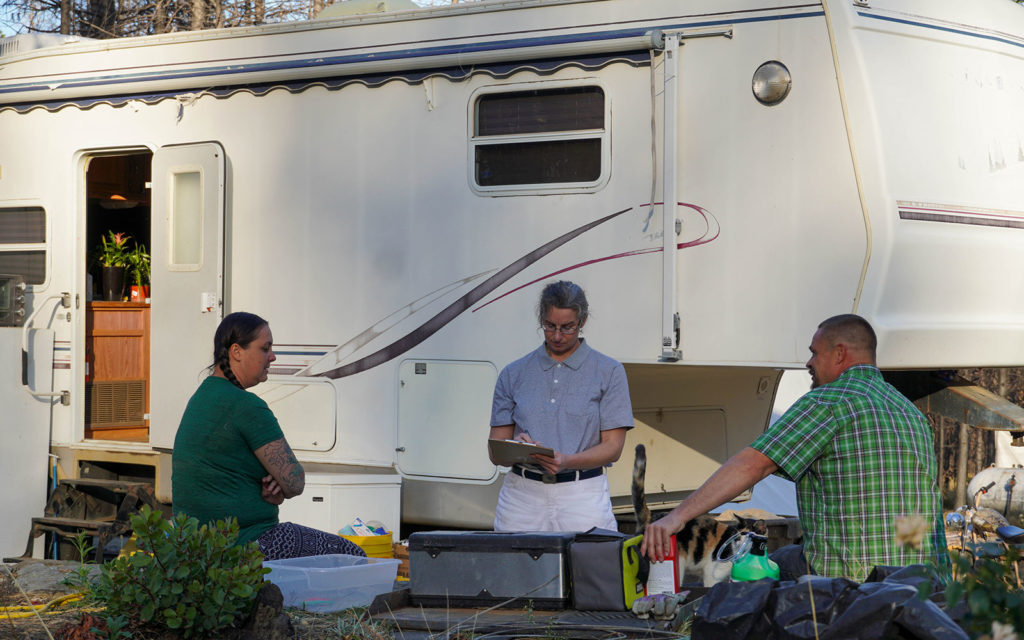
Shelby Boston, director of the Butte County Department of Employment and Social Services, said this expanded effort by the county runs through June 30, 2021, and is aimed at tackling the backlog of applicants. Case managers are targeting serving a minimum of 1,400 individual survivors who’ve been left out, but hope to be able to help more.
“We’re very mindful of the unmet needs still in the Concow area,” Boston said. “We’re here and want to be able to assist folks. We recognize that everyone recovers at their own pace, and it’s not an easy load [to bear].”
Bobbie Rae Jones has seen the issues in Concow up close. She’s been a disaster case manager for Camp Fire recovery since May 2019, working through the Buddhist Tzu Chi Foundation, a humanitarian organization that has been providing relief and assistance since the day the blaze ignited.
The nonprofit has two disaster case managers who have taken on a total of 60 households, most in Concow and Yankee Hill. The organization made a shift to focus on these smaller communities this year, Jones said, identifying a greater need in those areas, where living situations like Salinas’ are not uncommon.
“We meet people—some of them are in tents and some are in trailers—and they were homeowners. And there’s not enough resources to get them back into stable housing, and so it’s frustrating,” Jones said. “We have a lot of families that would like to build their home and they lack the financial resources right now to do that.”
The case managers work hard on connecting families to available financial and material resources, Jones said, but the housing crisis and sheer volume of the need makes it challenging.
“Most everybody we work with is low-income and doesn’t have any money on hand. So then it’s sort of problem-solving and taking small steps,” she said. “A lot of people are just busy with surviving.”
Surviving involves living with trauma every day. That’s why Tzu Chi’s mission of providing emotional and spiritual comfort is important, Jones said. It’s something she witnessed firsthand during a recent visit with a family in Concow. She’d arrived prepped for talking about the steps to rebuild and how to set the process in motion.
“When I got there, we sat down and said our greetings, and she went right into the day of the fire,” Jones said.
“It was very emotional. She had been trapped in the fire some time before rescue crews got her out. … She didn’t need to hear about how to build a house right [then]—she just needed a friend to sit and listen and care for her.”
Salinas—the mother struggling to rebuild in Concow—has faced barriers with disaster case management. She came away frustrated and with the impression she was “too poor to be helped.” As an independent cosmetologist and worker of odd jobs, she has nontraditional income sources, she explained, and was told she could not receive assistance because it did not appear that she could afford to maintain her property.
She does all the work she can, but it’s hard not feeling stuck and helpless, she said, especially handling everything as a single mom.
“I cry a lot because of it. I haven’t had the patience with my daughter as much,” she said. “It’s really hurtful to be told you’re not worth the money that’s been donated to us.”
Kate Scowsmith, the Camp Fire Collaborative’s disaster case management systems facilitator, said any survivors who have experienced issues like this should reach out to their case manager again or, if necessary, their case manager’s supervisor. Then, if they still experience issues, consider filing a grievance with the organization providing their case manager.
“This is a system that we’re building that’s never been built [in Butte County] before,” she said. “And we’ve done so much over time to try to address the needs as best as we can with the resources we have.”
A village for recovery
When Jenny Lowrey arrived in Concow in 2012, she had already lost everything. Her husband had committed suicide, she’d suffered seven heart attacks, and she’d lost her job. There was nowhere for her to turn but to the little community, where her son, Hap Hathaway, had settled down. She set up an RV at Lake Concow Campground, in an idyllic forest leading down to the shores of a glistening lake.
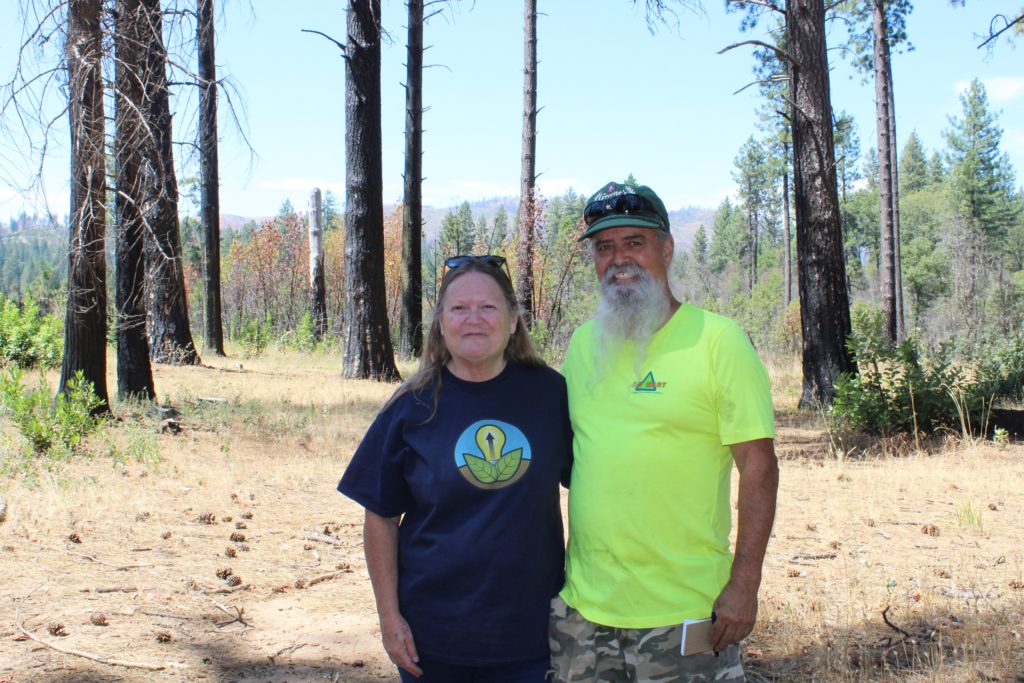
Concow is where Lowrey found herself, she said—her health, her sanity and her spirit. It’s where she founded From the Ground Up Farms, a nonprofit that distributes fresh, garden-picked food to low-income and poor families. And, in 2018, it’s where she lost everything again.
After the Camp Fire, Lowrey relocated to Durham out of necessity, but she’s been working hard to return home to Concow. She was driven right away to help her community rebuild—visiting distribution centers and handing out supplies to fellow survivors. With the help of her partner, Bruce Matthews, along with her son and other volunteers, From the Ground Up has launched several recovery efforts.
They secured several grants from the North Valley Community Foundation for a mobile sawmill, tractor and back hoe, and have been volunteering their time and labor to help clear and develop people’s fire-ravaged properties. Hathaway has been operating the sawmill, going property to property in Concow and offering to cut dead and downed trees. This wood has since been used to make storage sheds, bathrooms and livestock housing.
Lowrey also has been coordinating food deliveries and distributions to Concow and surrounding communities, an area that’s considered a food desert. Most recently, she gathered more than a dozen agencies to distribute 22,000 pounds of free food to low-income families and Camp Fire survivors.
In addition, From the Ground Up is embarking on a housing project, Recovery Village. Even before the fire, the campground served as a safe place for people who were struggling—homeless folks, including Salinas, who stayed there when she first moved to Concow, and refugees of disasters such as the Oroville Spillway crisis. But when the Camp Fire came through, the campground was hit hard. It took Lowrey’s family 18 months to finish debris removal and restore power to the campground—and that’s with insurance, Lowrey added. They are part of a group of Concow residents who are leasing to own the campground.
“My phone rings every single day with people crying saying, ‘Please, I have nowhere to go. Is the campground ready?’” Lowrey said. “Our connection to the campground made us realize we have a moral obligation to this community.”
The family’s vision is to create 12 spots for RVs or tiny homes with hookups to power, water and septic. The village would house families who need a safe place to stay while they work on recovery.
“We’re the only place they have to go. It’s critical this place gets opened,” Lowrey said.
It’ll include a free community tool-lending library and food pantry for all community members in Concow, as well as a children’s playground at the site of the old campground manager’s home.
“We’re trying to make a difference that’s going to be there for years to come, for a community that does matter,” Lowrey said. “Somebody has to help. Somebody has to step up and say, ‘I’m going to raise my voice, I’m going to use my voice for good, I’m going to help these people.’ And that’s our volunteers.”
From the Ground Up has to secure over $200,000 to get Recovery Village established—just in design, permitting and installation fees—through grants and/or donations. Lowrey knows that’s a big ask, but she and her team are driven to help. People don’t have any money to rebuild or anywhere else to go, she said.
“This is what motivates us. This is what’s unacceptable to us,” she said. “We’re going to hunker down and we’re going to change things for Concow.”
Need a disaster case manager? Butte-Glenn 211, a call center that provides referrals to local resources, assists Camp Fire survivors. Dial 211, text your zip code to 898211, or email helpcentral@ncen.org to get connected. Visit helpcentral.org to learn more.

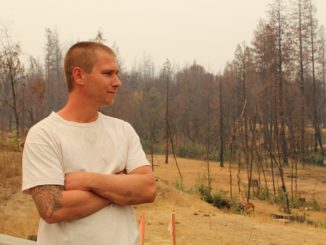
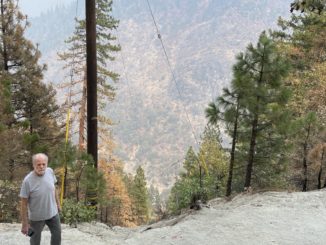
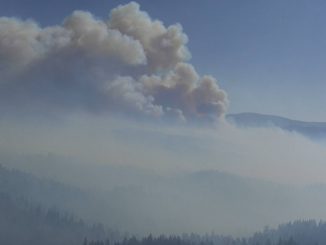
It doesn’t help that clean-up in Concow wasn’t even started until last summer and didn’t conclude until November. This area couldn’t even begin to rebuild until then. We are behind Paradise in rebuilding in EVERY way. We certainly shouldn’t be held to the same standards.